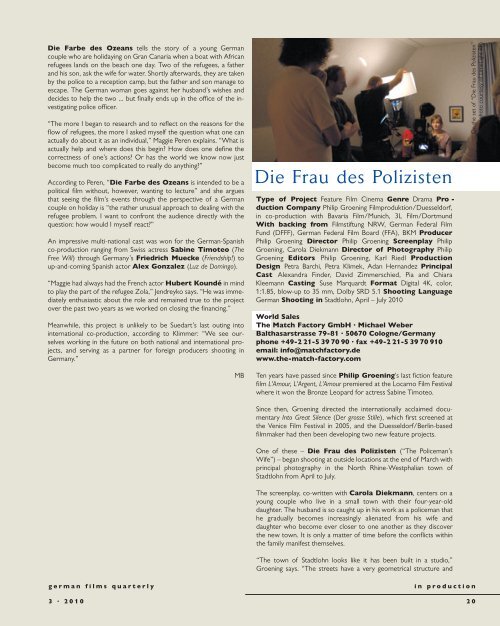German Films
German Films
German Films
You also want an ePaper? Increase the reach of your titles
YUMPU automatically turns print PDFs into web optimized ePapers that Google loves.
Die Farbe des Ozeans tells the story of a young <strong>German</strong><br />
couple who are holidaying on Gran Canaria when a boat with African<br />
refugees lands on the beach one day. Two of the refugees, a father<br />
and his son, ask the wife for water. Shortly afterwards, they are taken<br />
by the police to a reception camp, but the father and son manage to<br />
escape. The <strong>German</strong> woman goes against her husband’s wishes and<br />
decides to help the two ... but finally ends up in the office of the in -<br />
vestigating police officer.<br />
“The more I began to research and to reflect on the reasons for the<br />
flow of refugees, the more I asked myself the question what one can<br />
actually do about it as an individual,” Maggie Peren explains. “What is<br />
actually help and where does this begin? How does one define the<br />
correctness of one’s actions? Or has the world we know now just<br />
become much too complicated to really do anything?”<br />
According to Peren, “Die Farbe des Ozeans is intended to be a<br />
political film without, however, wanting to lecture” and she argues<br />
that seeing the film’s events through the perspective of a <strong>German</strong><br />
couple on holiday is “the rather unusual approach to dealing with the<br />
refugee problem. I want to confront the audience directly with the<br />
question: how would I myself react?”<br />
An impressive multi-national cast was won for the <strong>German</strong>-Spanish<br />
co-production ranging from Swiss actress Sabine Timoteo (The<br />
Free Will) through <strong>German</strong>y’s Friedrich Muecke (Friendship!) to<br />
up-and-coming Spanish actor Alex Gonzalez (Luz de Domingo).<br />
“Maggie had always had the French actor Hubert Koundé in mind<br />
to play the part of the refugee Zola,” Jendreyko says. “He was immediately<br />
enthusiastic about the role and remained true to the project<br />
over the past two years as we worked on closing the financing.”<br />
Meanwhile, this project is unlikely to be Suedart’s last outing into<br />
international co-production, according to Klimmer: “We see our -<br />
selves working in the future on both national and international projects,<br />
and serving as a partner for foreign producers shooting in<br />
<strong>German</strong>y.”<br />
MB<br />
Die Frau des Polizisten<br />
Type of Project Feature Film Cinema Genre Drama Pro -<br />
duction Company Philip Groening Filmproduktion/Duesseldorf,<br />
in co-production with Bavaria Film/Munich, 3L Film/Dortmund<br />
With backing from <strong>Films</strong>tiftung NRW, <strong>German</strong> Federal Film<br />
Fund (DFFF), <strong>German</strong> Federal Film Board (FFA), BKM Producer<br />
Philip Groening Director Philip Groening Screenplay Philip<br />
Groening, Carola Diekmann Director of Photography Philip<br />
Groening Editors Philip Groening, Karl Riedl Production<br />
Design Petra Barchi, Petra Klimek, Adan Hernandez Principal<br />
Cast Alexandra Finder, David Zimmerschied, Pia and Chiara<br />
Kleemann Casting Suse Marquardt Format Digital 4K, color,<br />
1:1.85, blow-up to 35 mm, Dolby SRD 5.1 Shooting Language<br />
<strong>German</strong> Shooting in Stadtlohn, April – July 2010<br />
World Sales<br />
The Match Factory GmbH · Michael Weber<br />
Balthasarstrasse 79-81 · 50670 Cologne/<strong>German</strong>y<br />
phone +49-2 21-5 39 70 90 · fax +49-2 21-5 39 70 910<br />
email: info@matchfactory.de<br />
www.the-match-factory.com<br />
Ten years have passed since Philip Groening’s last fiction feature<br />
film L'Amour, L'Argent, L'Amour premiered at the Locarno Film Festival<br />
where it won the Bronze Leopard for actress Sabine Timoteo.<br />
Since then, Groening directed the internationally acclaimed documentary<br />
Into Great Silence (Der grosse Stille), which first screened at<br />
the Venice Film Festival in 2005, and the Duesseldorf/Berlin-based<br />
filmmaker had then been developing two new feature projects.<br />
One of these – Die Frau des Polizisten (“The Policeman’s<br />
Wife”) – began shooting at outside locations at the end of March with<br />
principal photography in the North Rhine-Westphalian town of<br />
Stadtlohn from April to July.<br />
The screenplay, co-written with Carola Diekmann, centers on a<br />
young couple who live in a small town with their four-year-old<br />
daughter. The husband is so caught up in his work as a policeman that<br />
he gradually becomes increasingly alienated from his wife and<br />
daughter who become ever closer to one another as they discover<br />
the new town. It is only a matter of time before the conflicts within<br />
the family manifest themselves.<br />
“The town of Stadtlohn looks like it has been built in a studio,”<br />
Groening says. “The streets have a very geometrical structure and<br />
german films quarterly in production<br />
3 · 2010 20<br />
On the set of “Die Frau des Polizisten”<br />
(photo courtesy of LimeLight PR)

















